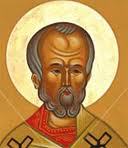Two very different posts about Papias have recently appeared online.
On Bart Ehrman’s blog, Papias and the Writers of the New Testament: Guest Post by Stephen Carlson. It follows on from an earlier post and appears to be early advertising for a new book by Stephen Carlson on Papias. Unfortunately Ehrman is not on board with the open access philosophy or movement so he has placed the pre-publication information behind a paywall.
Meanwhile, another article about Papias is now available to the paying public (@ $US45) in The Journal of Theological Studies and one that probably should be read before taking on Carlson’s upcoming book: Did Eusebius Read Papias? by Luke J. Stevens. Here is the abstract:
Although the Ecclesiastical History of Eusebius of Caesarea is our principal source of information on Papias of Hierapolis and his lost Exegesis of Dominical Oracles, it is here argued that Eusebius knew the work only at second hand. Several Papian fragments preserved elsewhere demonstrate his ignorance, and his citations of the Exegesis consistently differ in style from those of works certainly known to him at first hand. Apparently, the same intermediary that informed him about both Papias’s Exegesis and Hegesippus’s Hypomnemata was also used in the de Boor Fragments, and this intermediary’s author, perhaps Pierius of Alexandria, has handed down further Papian fragments through other works. Eusebius’s lack of first-hand knowledge prevents us from fully trusting the integrity of his summaries, from giving credence to his charges of chiliasm, and from drawing any conclusions from his silence, especially on what Papias may have said about Luke and John.
…
And for something completely different, the same journal has another article of interest to anyone studying the figure of Jesus in early Christian literature: The Dynamic Absence of Jesus in Hebrews
Again, the abstract
How does Hebrews negotiate the whereabouts of the risen Jesus, on the dialectical spectrum between physical and indeed metaphysical absence on the one hand, and affirmations of a continuing or intermittent presence on the other? More than perhaps any other New Testament writing, Hebrews concentrates on Jesus’s distance from the world of earthly Christian life and discipleship. And yet the author’s ‘word of encouragement’ (13:22) evidently serves his recipients’ situation more urgently through its emphasis on the Son’s heavenly high priesthood rather than on his immediate presence. The presence of Jesus is here most clearly articulated in relation to his incarnation in the past: unlike elsewhere in the New Testament, no obvious attempt is made to sublimate or compensate for the absence of Jesus by sacramental, mystical, or pneumatological means. Nevertheless, even the pastness of the incarnation remains a powerful and abiding ingredient both in Christ’s ongoing priestly work and in the expectation of his coming. As a result, Jesus’ seeming remoteness in Hebrews remains in important respects compatible with his continuing accessibility and closeness to pilgrim believers.
It sounds somewhat apologetic on the face of it. But still, I suspect it would contain enough substance of value for someone sifting out the apologetics. So anyone not part of a subscribing institution and free to part with another $US45 can read it.

